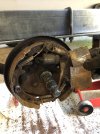wagonmaster
Member
Thought I'd post a short piece to share my experience with trailer brakes. Bought a 18 Campion 542 with a Road Runner trailer in 2004. Always rinsed the wheels thoroughly and kept in my garage since new. In 2017, I started having problems with the brakes (drum) getting stuck so that the tire would not rotate. Often fixed it by dragging the trailer forward a couple of feet and then reversing and hitting the brakes. I decided to have things attended to on three different occasions (2017-2020) with both SG and Alpine replacing parts and probably spent close to $2000. Seized brake shoes continued to be a problem, so I recently went to Island Spring in Ladysmith (recommended by a member here) and had disc brakes installed as well as new leaf springs...another $2500 poorer, but hopefully clear sailing from now on. Anyway, if anyone out there experiences the same issues, you might consider ditching the drum brakes for discs at the outset. Could be cheaper in the long run. Considered a new trailer, but $6500 was considerably more than the new brake installation.


